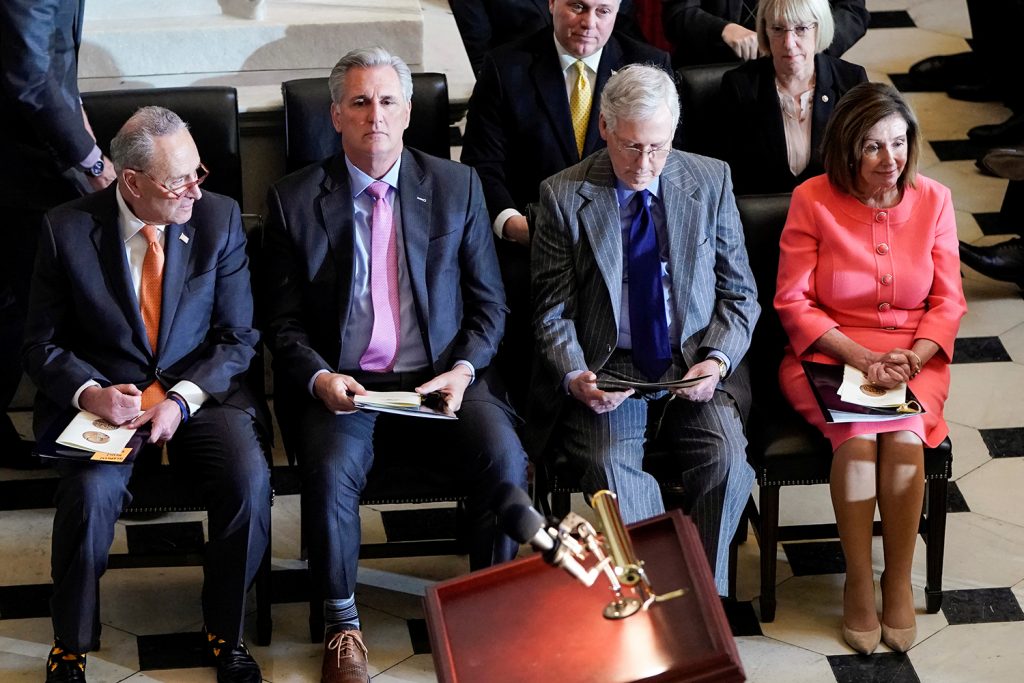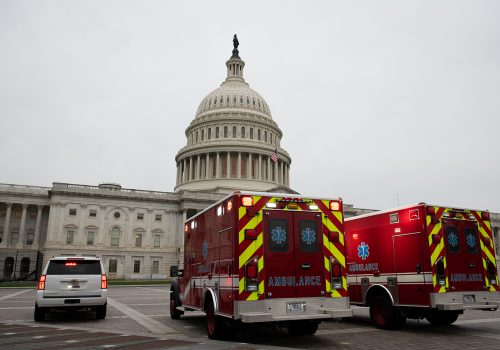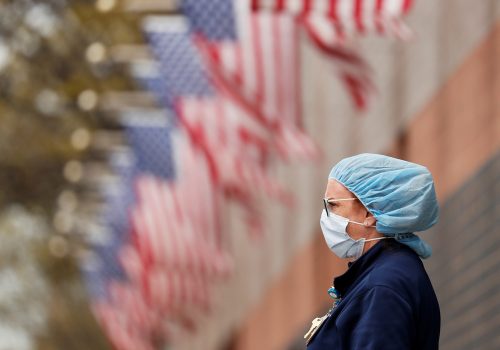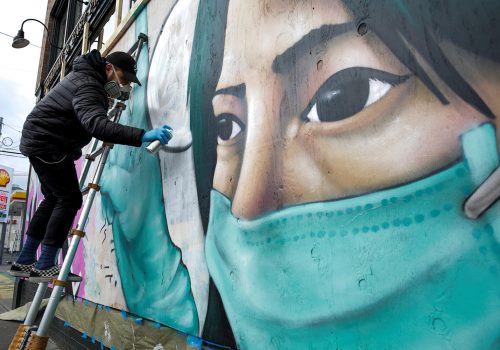In a previous piece, I spotlighted longstanding national threats to the United States, worsened by pandemic, that will require comprehensive political reform to meet. Correctly, the hard work of healing a system deeply infected by partisan division and public dysfunction must yield to the immediate demands of the COVID-19 crisis. But to meet these challenges, the nation needs the political echelon to suppress its parochial and partisan impulses. Without superb teamwork and cooperation across society, including our elected leadership, the country can’t possibly meet national urgencies that include:
- Minimizing loss of life and maintaining a downward vector in transmission rates
- Speeding the development and broad distribution of safe and effective therapies and vaccines, and access to personal protective gear
- Fast tracking accurate, widely available, and affordable testing for disease and immunity
- Building hospital capacity and medical strategic reserves to prepare for potential follow-on waves
- Improving means of tracing and notifying people in contact with infected individuals
- Developing scientifically sound and actionable data on personal risk factors, immunity, and reinfection
- Responsibly restarting the economy and moving it to high gear as soon as possible, without a significant risk of resurgence
- Delivering effective assistance to alleviate the human and economic pain of unemployment and bankruptcy
- Assuring that government assistance gets to where it is needed most first
- Securing supply chain of critical goods—including medicines and food
- Assuring that the November presidential and congressional elections can be executed safely, fairly, accurately, and without external interference or partisan gamesmanship
- Accurately reconstructing the circumstances that enabled COVID-19 to emerge and spread
History prepares us to expect that even matters of science and cases where options and answers are relatively clear will be politicized for squabble fodder. And despite the refreshing examples of bipartisanship in passing immediate COVID-19 relief measures, the parties and their flagbearers are unlikely to long resist the lust for partisan warfare, particularly in an election year.
Beyond the immediate priorities of halting disease transmission and saving lives, the current and post-coronavirus world poses monumental strategic challenges, at home and abroad, that US leadership must tackle purposefully and expertly. Forging consensus will require inspirational leadership thoughtfully focused on the future of the country, un-diverted by political posturing and devoid of intrigues designed to excite the passions of polarized partisan bases at the voting booth. E Pluribus needs Unum.
How best to extract lessons the learned from the COVID-19 experience and translate them into a sensible action agenda?
Surely some form of national pandemic commission will be established. A national response and review commission must not be a playground for partisan gamesmanship. It must be bipartisan (better yet, non-partisan) that can tell the COVID-19 story accurately and find truth wherever it falls. It must be trusted to derive accurate and meaningful lessons learned and chart ways to better anticipate, detect, prevent, respond to, and recover (economically and socially) from pandemic, including from microbes that might be more ferocious than coronavirus.
What should pandemic mean for US leadership and global institutions?
Republicans and Democrats will need to refrain from presenting equally irresponsible false choices to exploit political passions. The president has threatened to defund the World Health Organization (WHO) while others rush to its unqualified defense. Bipolar approaches make good election fodder. Neither solves problems. The question must be how to make important but underperforming global institutions like the WHO more responsive and effective. Accomplishing that will take US leadership not withdrawal. It requires exacting standards of performance for the global institutions we support, not knee-jerk internationalism at US expense.
How should pandemic alter trade and economic alliances?
We can expect that the ideological extremes and their respective special interests will exploit pandemic—one to push for protectionist policies and the other for business as usual. The fact is that the United States must rethink its supply chains to ensure dependable access to strategically critical supplies. In some cases, it should mean onshoring production capacity; but within well-conceived limits. US prosperity and physical security are ill-served by an America first and only response. We should seek to strengthen economic ties and greater trade opportunities with friends around the globe necessary to fuel mutually beneficial recovery, prosperity, and security.
How will adversaries exploit global crisis to destabilize democracy and what should we do about it?
The United States must candidly call out the dangerously bad behavior of autocrats calculated to exploit vulnerable circumstances, whether in the form of Russian bots spreading harmful coronavirus rumors or China’s obfuscation on the origins and outbreak of the virus. Republicans shouldn’t fear that spotlighting Russian meddling resurrects questions about the legitimacy of a president our intelligence community assesses the Kremlin actively sought to assist. Democrats shouldn’t paint efforts to call out the actions of autocracies as Republican attempts to avert focus from the administration’s own shortcomings in crisis response. This is a time for bipartisan commitment to protect, defend, and improve democracy.
How will the United States and the world deal with China’s actions leading to the breakout and spread of the virus?
The need to get tougher on China has been a rare area of bipartisan agreement since before the pandemic. One might expect that the parties will see traction in outracing one another to exploit voter passions. What’s needed, however, is unified bipartisan leadership committed to a purposeful and constructive agenda. This entails insisting that China truthfully inform the world exactly what happened and how. It means identifying practical and just means of holding China accountable that don’t boomerang. And, it will require leading a global consensus for change to retrograde Chinese behavior across many fronts. Extreme ideas, such as trade cessation or unilateral debt cancellation that could severely undermine the international commercial and financial systems make good political show but would make a bad situation worse for the United States and our allies.
How to address America’s urban-rural divide fueled by pandemic?
The seams of the US political division run deeply across an urban-rural divide widened by differing norms, needs, and sensibilities. One-size-fits-all approaches in crisis response and recovery will likely sharpen urban-rural tension and, by proxy, the red-blue conflict. A bipartisan agenda should include better urban policy and planning factoring in pandemic control and resilience, accompanied by supportive public policy that recognizes the critical role rural area and farming communities play in meeting the nation’s basic needs by recognizing theirs—including rural access to healthcare, critical infrastructure, and broadband.
What is the future of federalism in an era of borderless threats and consequences?
Basic notions of local and state control versus federal power will need to be revisited in the aftermath of COVID-19. Finding the sweet spot will require both parties to reconsider long-cherished biases. The nation needs a sensible, well-informed analysis of where national authorities are essential for effectively responding to borderless threats to public safety, and where state and local powers must be preserved and resources strengthened to ensure agile response, meet locality-specific needs, and spawn creative solutions.
How can the United States lead a more united world in combating shared threats?
The pandemic has altered the traditional conception of national security. The experience should inspire a bipartisan re-conception of diplomacy and global engagement as well, with the objective of making them a more effective tool for preventing the conception and maturation of transnational threats destined for the United States’ doorstep. More modern and effective US global engagement requires we cohesively harness all instruments of national power and better synch the US public and private sector. That means Democrats must rethink their antipathy to business as a tool for development and come to better appreciate the importance of security to global development. Republicans will need to more clearly see the value of global development to national security and complement their focus on effective threat response with stronger commitment to prevention.
More generally, the COVID-19 experience should motivate Democrats to a renewed respect for the importance of a thriving private sector and what’s required to keep it strong. Across the aisle, it should spur Republicans to measure good governance not just by how small and out of the way it can be, but how agile and effective it is in fulfilling its proper roles and missions.
Meeting the monumental challenges now and ahead will require America at its best. Further political distancing and masking over the symptoms of an ailing body politic will not serve our national wellbeing.
A positive legacy of coronavirus must be bipartisan, fundamental reform of the country’s political culture and public institutions to strengthen the nation’s recovery for a better future.
John Raidt is a nonresident senior fellow in the Middle East Security Initiative of the Scowcroft Center for Strategy and Security.
Further reading:
Image: Senate Minority Leader Chuck Schumer (D-NY), House Minority Leader Kevin McCarthy (R-CA), Senate Majority Leader Mitch McConnell (R-KY) and U.S. House Speaker Nancy Pelosi (D-CA) sit together during a Congressional Gold Medal Award ceremony for Steve Gleason at the U.S. Capitol in Washington, U.S., January 15, 2020. REUTERS/Joshua Roberts



